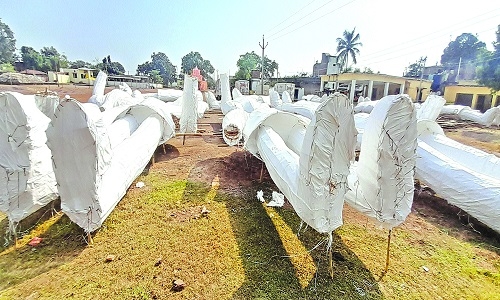Crafting Ravana effigies for over decades
| Date :23-Oct-2023 |

Our Correspondent
ANDA,
THE Sahu family, hailing from village Kuthrel in Durg district, has been dedicated to the art of creating Ravana effigies for more than 50 years. Dr Jitendra Sahu, a 48-year-old from the village, skillfully crafts these effigies, which find their way to different districts in the state year after year. This year, he has handcrafted 25 effigies, and these imposing creations are currently displayed at the local Leela Maidan, attracting the curiosity of visitors from near and far. In an interview with The Hitavada Correspondent, Dr Jitendra Sahu shared the rich legacy of his family’s craftsmanship. His father, the late Loman Singh Sahu, initiated the tradition of making Ravana effigies and passed it down to him. He fondly recalls that his father started this craft with a mere Rs 300 in hand. Back then, Loman Singh Sahu used to travel to Bhilai and other cities to create these effigies with the assistance of his team. Initially, they received orders for only 4-5 mannequins.
Remarkably, the Leela Mandali established by Dr Jitendra’s father continues its legacy in the village. Dr Jitendra Sahu began working alongside his father from a young age, honing his skills in crafting these effigies. Over the years, due to the growing demand, he now produces dozens of mannequins annually, and he has even established a workshop in the village for their construction. To date, he has created effigies towering up to 70 feet in height. This year, his orders range from 10 to 45 feet in height, with prices varying from Rs 10,000 to Rs 80,000. The process of crafting these effigies commences well in advance, around one and a half months before Dussehra. Dr Jitendra Sahu, along with his younger brother Anchal Kumar Sahu and a team of 20 dedicated employees, work tirelessly to complete the construction of these effigies.
Dr Sahu proudly claims that he creates the maximum number of Ravana effigies in State every year, and these remarkable creations journey to various cities within State. Last year, he even received an order for an effigy from Maharashtra. Despite their exceptional craftsmanship, he notes that artists who painstakingly craft these effigies are often overlooked by the government, unlike other forms of artwork, such as sculptures and paintings. Dr Sahu expresses the bittersweet sentiment associated with his work. Witnessing the effigies, the result of extensive labor, reduced to ashes on the day of Dussehra is a poignant experience. While the work of other artists endures, these effigies only survive in photographs, marking the end of an entire story after they are burnt.